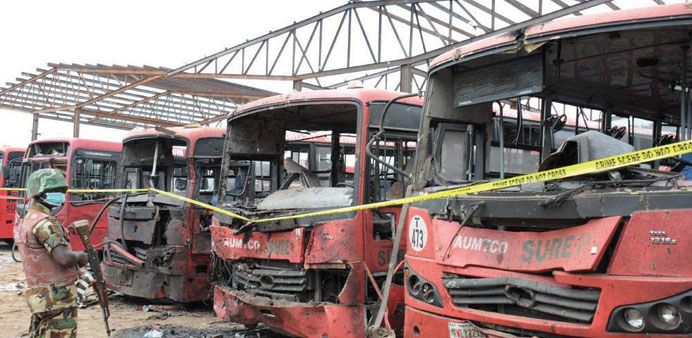A soldier stands guard in front of burnt buses after an attack in Abuja, yesterday. Twin blasts at a bus station packed with morning commuters on the outskirts of Nigeria’s capital killed dozens of people.
AFP
|
|
Seventy-one people died in a bomb blast in a packed bus station in Nigeria’s capital Abuja yesterday - the deadliest attack yet to strike the city - with the president blaming the explosion on Boko Haram Islamists.
The bomb, which also injured 124 people, rocked the Nyanya station on Abuja’s southern outskirts at 6:45am (0545 GMT) as it was filled with morning commuters, leaving body parts scattered across the terminal and destroying dozens of vehicles.
Previously, much of the recent violence by the Boko Haram insurgency has been in the remote northeast, though some have targeted the central capital.
The US condemned the attack, denouncing it as “senseless” and called for a full investigation into it.
“We are outraged by this senseless act of violence against innocent civilians,” State Department spokeswoman Jen Psaki told reporters.
“We continue to stand with the Nigerian government and people as they grapple with violent extremism,” she said.
The South African government, in a statement, also condemned the attack, saying that it believed that “terrorism, in any form and from whichever quarter, cannot be condoned”.
This major bombing, just a few kilometres from the seat of government, will raise further doubts about Nigeria’s ability to contain the Islamist threat it is battling.
The explosion “emanated from a vehicle” parked within the station, said Charles Otegbade, head of search and rescue at the National Emergency Management Agency.
National police spokesman Frank Mba put the toll at 71 dead and 124 injured. The wounded were being treated in area hospitals.
Visiting the site, President Goodluck Jonathan vowed that Nigeria would overcome the brutal insurgency being waged by Boko Haram, blamed for killing thousands across the north and centre of the country since 2009.
“The issue of Boko Haram is quite an ugly history within this period of our own development,” Jonathan said. “But we will get over it... The issue of Boko Haram is temporary.”
Yesterday’s explosions left a hole roughly 1.2m (4ft) deep and spread debris across the compound, an AFP reporter and witnesses said.
Bus parking zones have been among Boko Haram’s preferred targets, including a bombing at a terminal in the northern city of Kano last year that killed more than 40 people.
Jonathan, who is expected to face a tough re-election battle next year, has faced intense criticism over the continuing Boko Haram violence.

